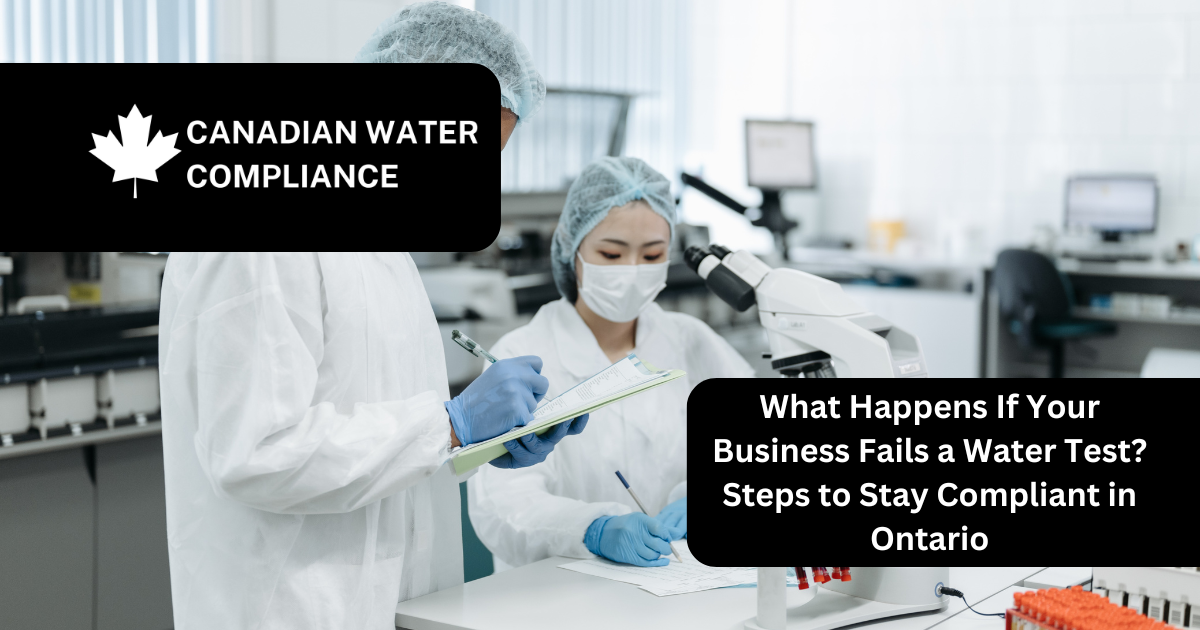
Written By: Canadian Water Compliance | On
Water quality is a critical factor for businesses across Ontario, especially those in hospitality, healthcare, manufacturing, and property management. A failed water quality test can lead to regulatory fines, health risks, reputational damage, and even business closures. If your business receives an adverse water test result, knowing why it happened and how to fix it quickly is essential to staying compliant and maintaining public trust.
In this guide, we’ll cover:
Common reasons businesses fail water quality tests
Ontario’s water safety regulations and compliance requirements
The immediate steps to take after failing a water test
How to prevent future water quality issues
Indicates fecal contamination or bacterial growth in water systems.
High risk in restaurants, hotels, and healthcare facilities.
Often caused by stagnant water, cross-contamination, or failing water treatment systems.
Common in older buildings with lead pipes, corroding plumbing, or industrial discharge.
Ontario’s Lead in Drinking Water Regulation (O. Reg. 243/07) requires businesses to monitor and mitigate lead exposure.
Grows in warm, stagnant water systems, including cooling towers, hot tubs, and plumbing systems.
Poses serious risks in hotels, apartment buildings, gyms, and industrial facilities.
Requires regular Legionella testing and maintenance as per Ontario’s Health Protection and Promotion Act (HPPA) (O. Reg. 428/05).
Industrial and agricultural businesses may exceed safe levels of chlorine, nitrates, or other chemicals.
Excessive disinfection byproducts can pose long-term health risks.
Ontario’s Safe Drinking Water Act, 2002 (SDWA) regulates chemical safety in drinking water.
pH imbalances can cause corrosion in pipes, lead leaching, and equipment damage.
Hard water leads to mineral buildup, reducing water heater efficiency and clogging fixtures.
Certain industries, like food production and healthcare, require strict water conditioning to maintain compliance.
Review the test report to determine which contaminants exceeded limits.
Assess the potential health risks and determine if immediate action is required.
If bacteria like E. coli or Legionella are present, notify public health authorities immediately.
Businesses in Ontario must comply with Ontario Regulation 170/03 (Drinking Water Systems), which outlines water testing and corrective action procedures.
If required, issue a Boil Water Advisory (BWA) and notify staff, customers, and stakeholders.
Work with local authorities like the Ministry of the Environment, Conservation and Parks (MECP) and your municipality’s health unit to determine next steps.
Disinfect and flush the water system if microbial contamination is present.
Install or upgrade filtration and treatment systems for lead, nitrates, or chemical contaminants.
Conduct plumbing inspections to identify sources of contamination (e.g., lead pipes, corroded fixtures, or cross-connections).
Increase water turnover and temperature control to prevent Legionella growth.
Conduct follow-up testing with a certified lab to ensure the issue is resolved.
Maintain detailed records of corrective actions and test results.
Submit compliance reports as required by Ontario law.
Schedule routine water testing to ensure ongoing compliance.
Train staff on water safety best practices and system maintenance.
Invest in water monitoring technology for real-time tracking of water quality.
Establish contingency plans for future incidents.
✅ Regular Testing: Follow industry-specific testing schedules (e.g., quarterly Legionella testing, annual lead testing).
✅ Water System Maintenance: Flush low-use water lines, clean cooling towers, and service water storage tanks.
✅ Upgrade Plumbing Infrastructure: Replace old lead pipes and corroded fixtures.
✅ Partner with a Certified Water Testing Provider: Work with experts like Canadian Water Compliance to stay ahead of potential problems.
A failed water test doesn’t have to mean disaster—but ignoring it can. Taking immediate corrective action, following regulatory requirements, and implementing a long-term prevention strategy will protect your business, employees, and customers.
🔎 Concerned about water compliance? Contact Canadian Water Compliance for professional testing & consultation services today!